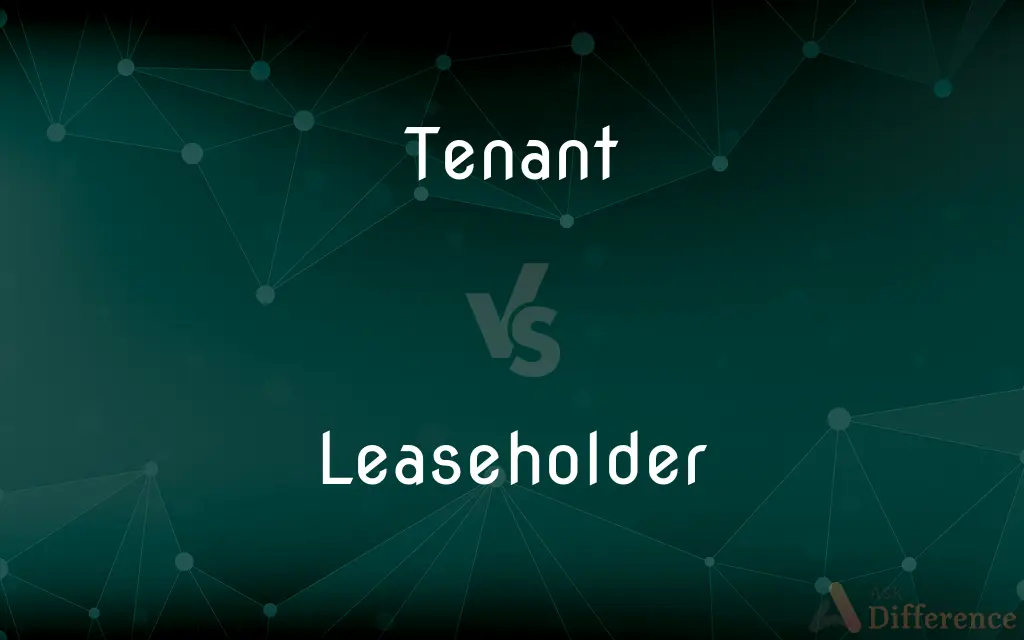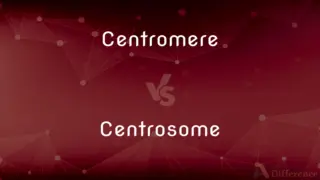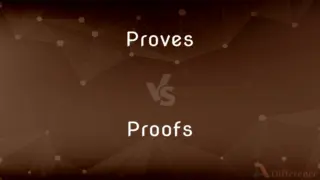Tenant vs. Leaseholder — What's the Difference?
By Fiza Rafique & Maham Liaqat — Updated on March 7, 2024
A tenant rents property for a short-term period, typically under a lease agreement, focusing on temporary occupancy. In contrast, leaseholder holds a longer-term interest in property, often spanning several years, and may have rights to make alterations.

Difference Between Tenant and Leaseholder
Table of Contents
ADVERTISEMENT
Key Differences
A tenant enters into a rental agreement or lease with a landlord for the use of property, usually for residential purposes. Whereas a leaseholder, also known as a lessee, may have a lease that extends for a longer duration, often several decades, and pertains not only to residential but also to commercial properties. Leaseholders have a more substantial interest in the property.
While tenants generally have limited rights to alter or improve the property without the landlord's permission, leaseholders might have more freedom in this area, depending on the terms of their lease. This distinction allows leaseholders to make significant investments in the property, enhancing its value or suitability for their purposes. On the other hand, tenants typically must seek landlord approval for any changes, which are usually minor.
The financial commitments between tenants and leaseholders also differ significantly. Tenants are responsible for regular rent payments and possibly utility bills or other minor charges. In contrast, leaseholders might pay a ground rent to the freeholder and are often responsible for maintenance fees, service charges, and insurance premiums, reflecting their longer-term interest and greater responsibility for the property.
Upon the expiration of a rental agreement, a tenant is expected to vacate the property or negotiate a renewal of the lease, often under potentially revised terms. However, leaseholders have a more secure position, with the right to occupy the property for the duration of the lease term, which can extend up to 99 years or more in some cases. This long-term security can make leasehold property an investment opportunity, though it comes with the complexities of lease management and obligations.
Despite these differences, both tenants and leaseholders must adhere to the terms set forth in their respective agreements. Failure to comply can lead to legal consequences, including eviction for tenants or forfeiture of the lease for leaseholders. Understanding the terms and obligations of their agreements is crucial for both parties to maintain their occupancy and protect their rights.
ADVERTISEMENT
Comparison Chart
Duration of agreement
Short-term (e.g., 12 months)
Long-term (e.g., decades)
Rights to alter property
Limited, requires landlord's permission
More extensive, depending on lease terms
Financial obligations
Rent, possibly utilities
Ground rent, maintenance fees, service charges
Property use
Residential, sometimes commercial
Residential and commercial
Term security
Must renegotiate or vacate at term end
Long-term occupancy rights, up to 99 years or more
Compare with Definitions
Tenant
Renewal negotiations.
Tenants may negotiate lease terms upon renewal.
Leaseholder
Long-term interest.
The leaseholder secured a 99-year lease on the property.
Tenant
Short-term occupancy.
The tenant signed a one-year lease for the apartment.
Leaseholder
Rights to make alterations.
Leaseholders can renovate the property subject to lease conditions.
Tenant
Limited alterations.
Tenants must request permission to paint walls or make changes.
Leaseholder
Investment potential.
Leasehold properties can be an investment, allowing for improvements.
Tenant
Monthly rent payments.
Rent is due at the beginning of each month.
Leaseholder
Secure long-term occupancy.
Leaseholders have the right to occupy the property for the duration of the lease.
Tenant
Temporary housing solution.
Renting offers flexibility for those not ready to purchase a home.
Leaseholder
Ground rent and charges.
Annual ground rent and service charges are paid by the leaseholder.
Tenant
One that pays rent to use or occupy land, a building, or other property owned by another.
Leaseholder
The fact or condition of holding property by lease.
Tenant
A dweller in a place; an occupant.
Leaseholder
Property held by lease.
Tenant
To hold as a tenant or be a tenant.
Leaseholder
A person who is tenant by holding a lease; a lessee.
Tenant
One who holds a lease (a tenancy).
Leaseholder
A tenant under a lease.
Tenant
(by extension) One who has possession of any place.
Leaseholder
A tenant who holds a lease
Tenant
(computing) Any of a number of customers serviced through the same instance of an application.
Multi-tenant hosting
Tenant
One who holds a feudal tenure in real property.
Tenant
One who owns real estate other than via allodial title.
Tenant
Misconstruction of tenet
Tenant
To hold as, or be, a tenant.
Tenant
(transitive) To inhabit.
Tenant
One who holds or possesses lands, or other real estate, by any kind of right, whether in fee simple, in common, in severalty, for life, for years, or at will; also, one who has the occupation or temporary possession of lands or tenements the title of which is in another; - correlative to landlord. See Citation from Blackstone, under Tenement, 2.
Tenant
One who has possession of any place; a dweller; an occupant.
The hhappy tenant of your shade.
The sister tenants of the middle deep.
Tenant
To hold, occupy, or possess as a tenant.
Sir Roger's estate is tenanted by persons who have served him or his ancestors.
Tenant
Someone who pays rent to use land or a building or a car that is owned by someone else;
The landlord can evict a tenant who doesn't pay the rent
Tenant
A holder of buildings or lands by any kind of title (as ownership or lease)
Tenant
Any occupant who dwells in a place
Tenant
Occupy as a tenant
Common Curiosities
Can tenants become leaseholders?
Yes, tenants can become leaseholders if they enter into a long-term lease agreement, which may involve different terms and obligations.
What is a tenant?
A tenant is someone who rents property under a short-term agreement, typically for residential use, with limited rights to modify the property.
Can tenants sublet their rented property?
Tenants may sublet their property if allowed by their lease agreement and with the landlord's permission.
What is a leaseholder?
A leaseholder holds a longer-term interest in a property, often spanning several years or decades, with greater rights to make alterations and certain financial obligations.
What happens when a leasehold term ends?
When a leasehold term ends, the property typically reverts to the freeholder unless the lease is extended.
What are the main financial obligations of a leaseholder?
Leaseholders may pay ground rent, maintenance fees, and service charges, reflecting their longer-term interest in the property.
Can a leaseholder sell their interest in the property?
Yes, leaseholders can sell their leasehold interest, subject to the terms of their lease and sometimes with the freeholder's consent.
How does the security of term differ between tenants and leaseholders?
Tenants have short-term security and must renegotiate or vacate at the end of their lease, while leaseholders have long-term security, often for decades.
Are leaseholders responsible for property maintenance?
Yes, leaseholders are often responsible for interior maintenance and may contribute to exterior and common area upkeep through service charges.
Do both tenants and leaseholders need insurance?
Yes, both may need insurance, but their responsibilities differ. Tenants usually need renters' insurance, while leaseholders might need more comprehensive coverage for the property.
What is ground rent?
Ground rent is a fee leaseholders pay to the freeholder, typically annually, for the land on which their leasehold property sits.
How can disputes between tenants/leaseholders and landlords be resolved?
Disputes can often be resolved through mediation, arbitration, or legal action, depending on the nature of the dispute and the terms of the agreement.
What rights do leaseholders have over communal areas?
Leaseholders often have rights to use communal areas, but these rights are subject to the terms of their lease and any applicable service charges.
What is a freeholder?
A freeholder owns the property and the land outright, including any leasehold interests in the property.
How do lease extensions work?
Leaseholders can often extend their leases, subject to legal requirements and negotiations with the freeholder, which may involve additional costs.
Share Your Discovery

Previous Comparison
Centromere vs. Centrosome
Next Comparison
Proves vs. ProofsAuthor Spotlight
Written by
Fiza RafiqueFiza Rafique is a skilled content writer at AskDifference.com, where she meticulously refines and enhances written pieces. Drawing from her vast editorial expertise, Fiza ensures clarity, accuracy, and precision in every article. Passionate about language, she continually seeks to elevate the quality of content for readers worldwide.
Co-written by
Maham Liaqat













































